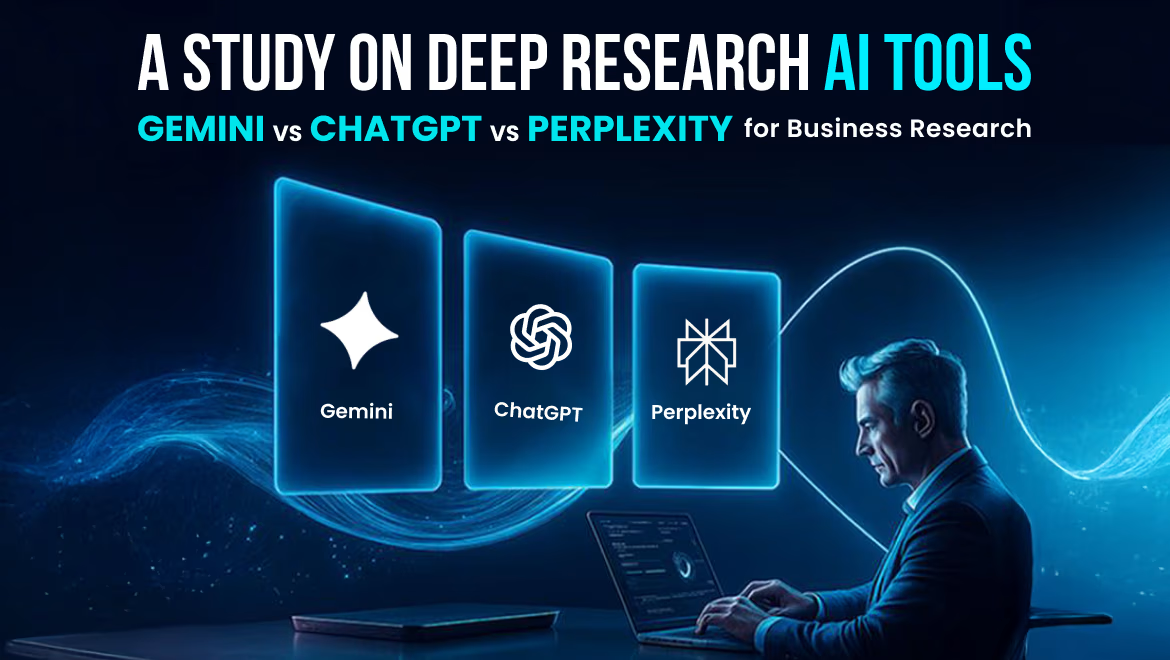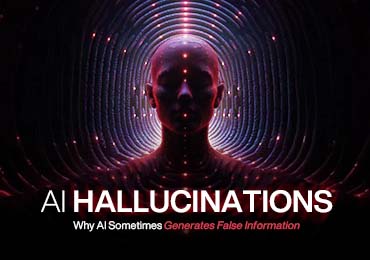

- By Aryabh Consulting Inc.
- 01 September, 2025
- 8 min Read
A Study on Deep Research AI Tools: Gemini, ChatGPT & Perplexity for Business Decision Makers
How Deep Research AI Will Drive Businesses in 2025
Have you ever thought about why 78% of organizations use AI in at least one business function? It’s more than simply ease – with Artificial Intelligence (AI), businesses equip themselves with a partner that drives fast, accurate, and data-backed decision making, especially with ‘deep research’ tools.
While your traditional manual searches can only take you so far, with advanced Deep Research AI, businesses get a first-seat access to vast quantities of information that are analyzed and synthesized to generate actionable insights and structured reports within just a few minutes.
In this blog, we’ll comparatively analyze three of the best deep research AI tools, namely, Google’s Gemini, Open AI’s ChatGPT and Perplexity AI, to provide founders, business leaders, and decision makers with the best understanding of their capabilities, strengths, weaknesses, and applications. With this Perplexity ChatGPT Gemini comparison 2025, find the best deep research tool that matches with your business goals.
Deep Research AI Explained in Simple Terms
Before you ask what the best deep research model is, it’s important to understand what ‘deep research’ truly means. In short, deep research AI refers to the advanced AI systems that emulate human research habits by reasoning, researching, and synthesizing data from multiple internet sources to execute a multi-step research process to arrive at well-cited and strategic report documentations.
Skip the simple question-answering AI tools, and get strategic business solutions with deep research AI that can perform market analysis, academic research, service comparisons, and financial forecasting to guide you towards faster, more reliable, and data-backed decision-making.
With the global Generative AI market projected to reach a valuation of USD 109.37 billion by the end of 2030, the deep research landscape is not only expected to grow, but become the prime driver of business research, strategy, and decision making. Currently, the deep research AI market is being led by Google Gemini AI, OpenAI’s ChatGPT, and Perplexity.
Gemini vs. ChatGPT vs. Perplexity: An Overview
Google Gemini AI Deep Research
- Built on the Gemini 2.5 model, Google Gemini’s Deep Research employs a Mixture-of-Experts (MoE) transformer model seamlessly integrated with Google’s extensive ecosystem of services like Search, Drive, and Docs to bring together the best of web technologies.
- Effective in long, multi-step planning and can autonomously function in an open domain setting across all topics, browsing over hundreds of webpages to formulate multi-point research plans, and generate highly interactive and detailed reports with verified citations.
- Gemini Deep Research functions as an agentic tool with a long-running interface and an industry-leading 1 million token context window complemented with a Retrieval Augmented Generation setup to ensure reasoning, logical deductions, and continuity.
ChatGPT OpenAI Deep Research
- Powered by the OpenAI O3 model and trained using an end-to-end reinforcement learning across a range of domains to find, analyze, and synthesize over hundreds of online sources to generate comprehensive and well-documented reports that are at the level of an analyst within a few minutes.
- Executes a multi-step roadmap to find data, backtrack, and react to real-time information, including uploading files that are iterated on graphs, citing specific sentences from verified sources, and embedding images from websites into responses.
- Demonstrates a human-like approach to configuring research-based tasks within 5 to 30 minutes, with an expertise in over 100 subjects to counter real-world challenges and devise reports and strategies to bridge the gap between fast, accurate, and data-driven decision making.
Perplexity AI
- Uniquely aggregates multiple advanced AI models to perform real-time searches across Google, Bing, academic databases, social media, and forum platforms to generate responses in a record time of 2-3 minutes.
- Trained with expert searching and coding capabilities to read documents thoroughly, arrive at expert analysis, and reason towards strategic research to synthesize the data into a clear, cited, and comprehensive report.
- Achieves an unmatched score in research depth and data integration within record time, implementing quick processing of multiple data sources with a strong balance of breadth and accuracy.
Strengths and Weaknesses: A Detailed Comparison
| Feature | Gemini | ChatGPT | Perplexity |
|---|---|---|---|
| Architecture | 2.5 models + Google ecosystem | GPT O3 reasoning model | Multi-model Sonar ensemble + search engine |
| Information Source | Google real-time + internal data | Large-scale training + Bing | Real-time web, academic, WolframAlpha |
| Citation Style | Per-paragraph | Limited | Sentence-level in-text |
| Output Format | Multi-page interactive reports | Conversational/creative texts | Structured, highly verified data |
| Best Use | Logical, broad analysis in Google Stack | Creative content | Accurate, verified, fact-based |
| Speed | 1-2 minutes | 5-30 minutes | Under 3 minutes |
| Subscription | $20/user | $25/user | $40/seat |
| Humanity’s Last Exam | 18.8% | 26.6% | 21.1% |
How Deep Research AI Will Enhance Business Impact in 2025
- Gemini utilizes Google’s indexed web content and ecosystem (Docs, Drive, Gmail) for logical reasoning and synthesis to produce comprehensive reports.
- ChatGPT leverages its pre-trained dataset (internet, books, licensed data) with Bing’s API and the O3 model for complex, multi-faceted questions.
- Perplexity combines real-time results from multiple sources and databases like WolframAlpha with coding and data analysis for well-cited outputs.
Challenges and Risks of Relying on Deep Research
- Gemini’s MoE architecture dynamically allocates computational resources for reasoning but can generalize.
- ChatGPT’s single large Transformer is creative but prone to occasional bias or lack of transparency.
- Perplexity excels in transparency but may produce repetitive structures if not guided.
Tools That Align Business Needs
| Task | Recommended Tool | Notes |
|---|---|---|
| Business research | Perplexity | Real-time accuracy, well-cited |
| Business content | ChatGPT | Creative, natural writing |
| Fact verification | Perplexity | Fast & accurate |
| Market analysis | Gemini | Broad, integrated insights |
| Coding assistance | ChatGPT | Strong with examples |
| Compliance reviews | Perplexity | Citation-backed data |
| Demand forecasting | Gemini | Multi-modal optimized reports |
| Customer interaction | ChatGPT | Human-like conversational |
| Inventory optimization | Gemini | Handles large datasets |
One Prompt, Galore Possibilities!
Prompt: "Assess the economic impact of trade tariffs on global supply chains"
- Structured, broad analysis but fewer citations.
- ChatGPT: Clear insights and frameworks but limited citations.
- Perplexity: Detailed, cited, region-specific, but can be repetitive.
Conclusion: Perplexity for factual transparency, ChatGPT for creativity, Gemini for concise, integrated workflows.
Common FAQs about Deep Research
1. Which tools offer unbiased outputs? Perplexity ranks highest due to inline citations. Gemini follows with paragraph-level citations, while ChatGPT is best for creative synthesis.
2. Difference in source attribution? Perplexity: sentence-level; Gemini: paragraph-level with Google integration.
3. Are outputs 100% accurate? No. Always cross-verify high-stake research.
4. Can these tools replace research teams? No, they augment but don’t replace human expertise.
5. Can Gemini or others make mistakes? Yes, all AI can err. Fact-checking remains vital.
6. Best alternatives to ChatGPT? Gemini and Perplexity for strategic and factual research.
7. Is data privacy guaranteed? Most tools provide security, but for sensitive info, enterprise AI is recommended.
Final Words
While choosing the right deep research AI model, note that every tool –
Gemini, ChatGPT, and Perplexity – comes with their own strengths and
weaknesses.
For research-based factual reporting with citations →
Perplexity
For logic-based strategic planning → Gemini
For creative, conversational outputs → ChatGPT
With AI-based deep research, reduce hours or days of manual effort and
fact-checking into just minutes, deriving accurate, data-backed results for
unmatched business success.
